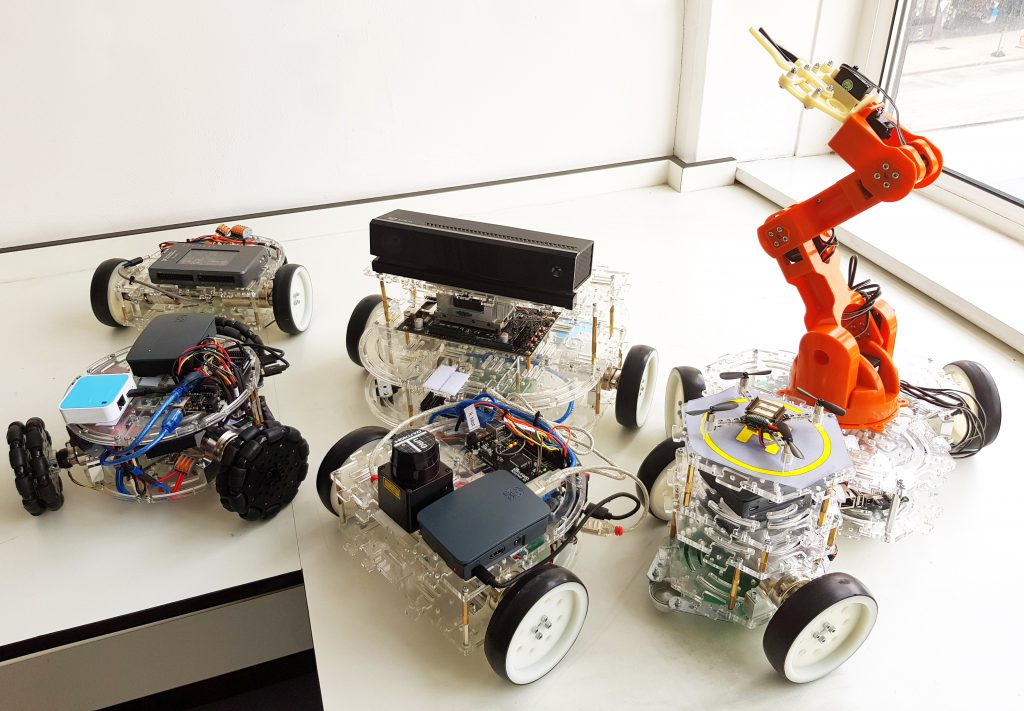how we got our start.
Our story.
Manchester Robotics Limited was born as a spinout company from The University of Manchester, United Kingdom. It was an initiative of the Robotics Research Group within the Aerospace Research Institute offering development platforms for academic research and education as well as for industrial prototyping.
Manchester Robotics Limited provides a unique educational product that resulted from our research activity, funded by UK Research Councils and Industry.


This is a cost effective, portable control laboratory that enables students, independent learners and hobbyists to develop skills in AI, autonomy, control systems, mechatronics, programming and communication via robotics. The platform has been used successfully already as a tool for remote teaching during the lockdown due to COVID19. The PuzzleBot, a “lab in a robot”, was given to every student the course and hence it enabled the academic to continue running lab sessions remotely, i.e., the students cannot come to the labs on campus so the labs went to the students’ home. Quieter students who found it difficult to speak up in group teaching environments now have their own unit on which they can test and innovate in their own time and space.
PuzzleBot becomes an amazing tool that can change the way we teach and interact with the students, something that can continue beyond the present COVID19 crisis. Working in partnership with NVIDIA we are making Puzzlebot a globally accessible platform to learn AI as well as all disciplines involved in the robotics area. We are doing this through the classical route, through universities as well as by democratising robotics through Coursera and in this way we approach all learners interested in robotics from every corner of the world and make robotics accessible to them.
What drives us.
Our mission is to democratise access to skills in Robotics and Automation that will drive future economic growth. Primary and secondary sectors of the global economy are rapidly adopting robotics, 50% of manufacturing operators are planning to work with robots by 2030. Education systems need to respond and adapt to the demand for robotics-related STEM skills. As a spin-out business, we would like to create globally accessible educational tools and resources to help learners from educational institutions within Universities, or individual learners online. To provide a pipeline that guides them from one on one stages in robotics towards real meaningful career opportunities in Industry 4.0, Robotics & Automation.

The problem as we see it is that there are many sectors in the economy moving towards automation. A large number of manufacturing and raw materials companies are considering implementing automation and robotics. But educational systems, apart from some leading institutions, are struggling to adapt and the existing curriculum does not address the specific details of robotics. This creates gaps in STEM skills. There are various reports that show that in Europe millions of job opportunities have basically gone unfilled because there is no supply of local labour, and this is now a growing world-wide issue.
In a nutshell, what we would like to do is provide learners, in whatever manner they want to learn, effectively a lab in a portable robot. An accessible, cost effective robotics starter kit where they can engage when they want, how they want, and access different syllabus or on-line learning pathways towards specific career opportunities in automation and robotics.
The PuzzleBot platform can be developed across Python, C++, ROS, and LabVIEW catering to learner’s preferred starting languages.x It is an open-source, plug-and-play solution capable of accommodating 3rd party off-the-shelf components, keeping unit costs low and education available to everyone, thereby democratising access.
Puzzlebot aims to support the upskilling and reskilling of the labour force in advance of the growth of automation and the Industrial Internet of Things (IIoT) within the workplace of tomorrow. Product continuity from entry-level access to research-level capabilities ensures learners can focus on progressing skills rather than having to constantly switch between robotics platforms.
Examples of existing learning solutions either cater to entry-level coding education, such as Arduino or RaspberryPi, or high-level robotics control such as the NVIDIA Jetson or Intel UPsquared. Few intermediate solutions exist, and no solutions span the full learning pipeline, forcing learners to re-skill in new coding languages and development environments. Moreover, high-level solutions lack integration with off-the-shelf components (OTSC) driving up the cost of units, forcing unfavourable unit/learner ratios.